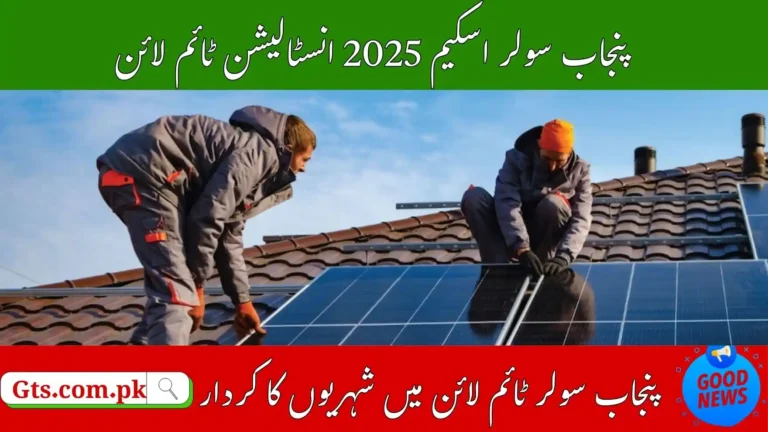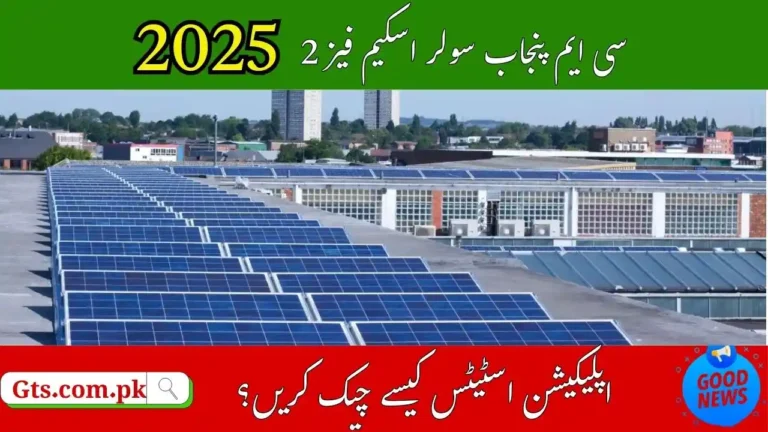Punjab Solar Panel Scheme 2025 Benefits – How Families Can Save More
The Punjab Solar Panel Scheme 2025 Benefits are becoming a major talking point for families across the region. With rising electricity bills, frequent power shortages, and growing environmental concerns, solar energy has emerged as a practical and sustainable solution. This scheme has been introduced to empower households, reduce dependence on conventional electricity, and encourage a shift towards renewable energy sources. For families, this initiative is not only about adopting a modern technology but also about long-term financial relief and a cleaner future.
The Punjab government has recognized the urgent need for sustainable energy solutions. The 2025 solar panel scheme is designed to make solar energy affordable and accessible for common households. Unlike private solar installation projects that demand heavy upfront investment, this government-backed initiative provides subsidies, financial assistance, and easy installment plans. Families who once thought solar panels were out of their reach can now dream of harnessing free, clean sunlight to power their homes.
This step is part of a larger vision: to promote renewable energy, reduce national dependence on imported fuels, and improve energy security.
Read Also: Punjab Free Solar Scheme 2025
Why the Punjab Solar Panel Scheme 2025 Benefits Matter?
The Punjab Solar Panel Scheme 2025 Benefits extend beyond just saving money. It is a program that touches multiple aspects of life—economic, environmental, and social. Here are the key reasons why families are eagerly adopting it:
- Reduced Electricity Bills – By generating their own electricity, families can cut down their monthly energy costs significantly.
- Subsidized Costs – The government provides partial funding to make installation affordable.
- Energy Independence – Households no longer rely solely on the national grid, reducing stress during power cuts.
- Long-Term Savings – Although installation requires investment, the returns over the years are substantial.
- Environmentally Friendly – Families contribute directly to reducing carbon emissions and combating climate change.
Financial Benefits for Families?
One of the biggest attractions of the scheme is financial relief. Electricity costs in Punjab have been rising steadily, putting pressure on middle-class households. By adopting solar panels through this scheme, families can enjoy:
- Lower Monthly Bills: Once panels are installed, sunlight is free. The only recurring cost is minimal maintenance.
- Payback Period: Families usually recover their initial investment within 3–5 years through savings. After that, electricity is practically free.
- Extra Income: In some cases, surplus electricity can be sold back to the grid, creating an additional revenue stream.
- Protection Against Price Hikes: While traditional electricity tariffs increase almost every year, solar energy remains unaffected by market volatility.
In the long run, solar panels are not an expense but an asset for the household.
Read Also: CM Punjab Solar Scheme 2025
How Families Can Save More?
Families adopting the Punjab Solar Panel Scheme 2025 Benefits can maximize their savings by following a few smart strategies:
- Choosing the Right System Size
- Households should calculate their average monthly electricity consumption before deciding the panel size. Installing a system larger than required may waste resources, while too small a system may fail to cover daily needs.
- Utilizing Subsidy and Financing Options
- Families should apply for available subsidies and consider government-backed loans with low interest rates. This reduces the upfront burden significantly.
- Efficient Energy Usage
- Using energy-saving appliances, LED bulbs, and smart power management ensures solar energy is utilized effectively.
- Battery Storage Solutions
- Adding a solar battery helps store excess energy for nighttime or cloudy days. This reduces dependence on the grid and increases cost savings.
- Regular Maintenance
- Cleaning panels and checking connections ensure the system runs at maximum efficiency, translating into higher savings.
Environmental and Social Impact?
The Punjab Solar Panel Scheme is not just about household benefits—it creates a ripple effect across society. Every family that installs solar panels reduces their carbon footprint. Over time, widespread adoption can lead to:
- Cleaner Air: Less reliance on coal and gas-based power plants reduces harmful emissions.
- Health Improvements: Cleaner environments result in fewer respiratory diseases.
- Job Creation: The solar industry generates employment in installation, manufacturing, and maintenance sectors.
- National Energy Security: By reducing fuel imports, the country saves valuable foreign exchange.
Thus, the benefits are shared not just by individual households but by the entire community.
Read Also: Maryam Nawaz Rs 1 Million Flood Relief 2025
Long-Term Vision of the Scheme?
The Punjab Solar Panel Scheme 2025 Benefits are aligned with global sustainability goals. As more families embrace solar energy, Punjab could become a model for renewable energy adoption in South Asia. The long-term vision includes:
- Achieving a significant percentage of energy production through renewables by 2030.
- Making solar energy accessible to rural and low-income families.
- Reducing dependency on fossil fuels to stabilize the economy.
- Building public awareness about clean energy practices.
This scheme is not just about today’s savings but about securing a better tomorrow.
Overcoming Common Concerns?
Many families hesitate to adopt solar technology because of misconceptions. Some worry about high costs, while others doubt efficiency. Here’s why those fears are misplaced:
- High Cost Myth: With subsidies and installment plans, solar systems are affordable.
- Durability Concerns: Panels last 20–25 years with proper care.
- Weather Issues: Modern systems work efficiently even during cloudy conditions.
- Maintenance Fear: Maintenance is minimal—usually just cleaning and occasional inspection.
By addressing these concerns, the government aims to build confidence and encourage more households to participate.
Practical Example of Family Savings?
Consider a middle-class household with an average electricity bill of PKR 12,000 per month. With solar panels under this scheme:
- Their bill could reduce to less than PKR 2,000 (mostly service charges).
- Annually, this means savings of over PKR 120,000.
- Over 20 years, the family could save more than PKR 2 million.
This example highlights why the scheme is being described as a “financial lifeline” for families.
FAQs Punjab Solar Panel Scheme 2025?
1. Who is eligible for the Punjab Solar Panel Scheme 2025?
All households in Punjab, particularly middle and lower-income families, are eligible. Priority may be given to families with limited access to reliable electricity.
2. How much subsidy does the government provide?
The subsidy percentage may vary, but the scheme ensures a significant reduction in installation costs, making solar panels more affordable.
3. Can I sell excess electricity back to the grid?
Yes, in many cases households can connect to the national grid and sell surplus electricity, generating additional income.
4. What is the lifespan of solar panels?
Solar panels typically last 20–25 years with minimal maintenance, making them a long-term investment.
5. Do solar panels work during load shedding?
Yes, especially if connected with battery storage. Stored energy can power the household during outages.
6. Is maintenance expensive?
No. Maintenance mainly involves cleaning panels and occasional inspections, which are low-cost.
7. How soon can families recover their investment?
Most families recover costs within 3–5 years through savings on electricity bills.
Conclusion Punjab Solar Panel Scheme 2025 Benefits?
The Punjab Solar Panel Scheme 2025 Benefits are a true breakthrough for families in Punjab. This initiative goes beyond reducing electricity bills—it ensures energy independence, long-term financial stability, and environmental protection. By adopting solar power, households are not only investing in their own future but also contributing to the nation’s progress and sustainability.
This scheme is more than just financial relief—it is a commitment to a cleaner, greener, and more secure Punjab. Families who take advantage of this opportunity today will be the pioneers of a brighter tomorrow.










